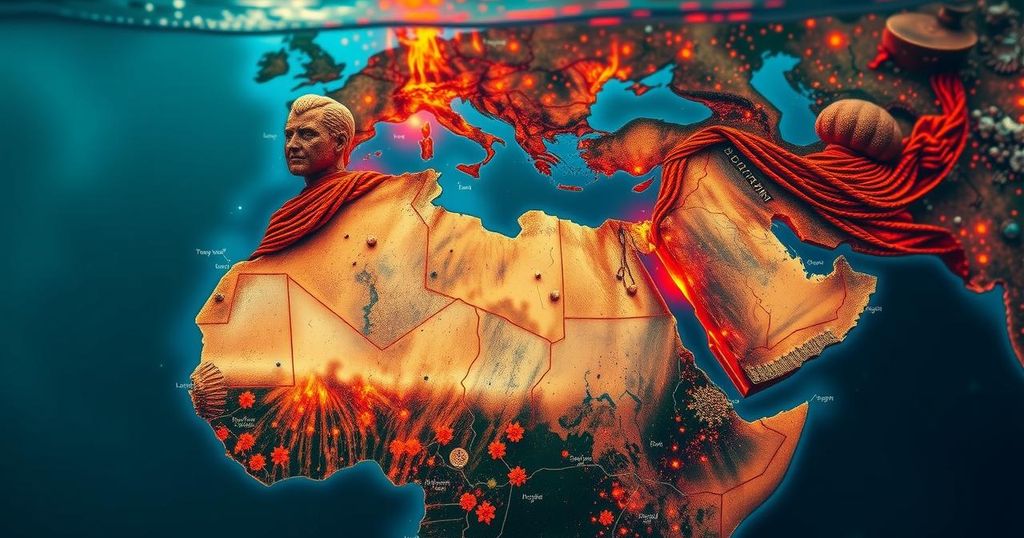Somalia’s recent defense pact with Egypt escalates tensions with Ethiopia, jeopardizing the fight against al-Shabaab. Despite past military gains, al-Shabaab remains a potent threat. The rift among regional players risks instability, potentially allowing al-Shabaab to expand its influence. EU mediation can play a crucial role in restoring cooperation amid tensions.
Somalia’s recent defense agreement with Egypt has provoked tensions with Ethiopia, complicating the efforts of their coalition to combat the jihadist group al-Shabaab. This unrest is emblematic of the fragile peace in the region, as illustrated by a recent mortar attack in Mogadishu that resulted in fatalities. Al-Shabaab continues to threaten the Somali government, further complicating the situation as it retains control over significant territories despite ongoing military operations by the Federal Government, aided by various international partners. The necessity of a unified military and political strategy in Somalia is imperative, yet the new pact with Cairo poses a risk by straining the already delicate relationship with Ethiopia. This could endanger crucial peacekeeping missions supplied by the AU, particularly ATMIS, which relies heavily on Ethiopian support. Compounding this issue, Somalia faces internal conflicts among its federal and state entities, potentially empowering al-Shabaab as the discord allows for a power vacuum. Since 2007, AU peacekeeping forces have worked alongside international allies to suppress al-Shabaab’s influence, but the organization remains a potent challenge. As ATMIS’s mandate nears expiration, continued infighting threatens future security arrangements, with Ethiopia as a vital player whose withdrawal could lead to instability in both Somalia and the broader region. Meanwhile, Egypt’s possible military contribution remains dubious due to logistical and financial constraints, limiting its ability to effectively replace Ethiopian troops. The deterioration in relations among Somalia, Egypt, and Ethiopia poses significant challenges for combating al-Shabaab. The Somali government’s attempts to diminish Ethiopian military presence could obstruct AU planning and exacerbate existing fissures in governance. Disagreements among Somali states concerning troop deployments highlight the internal strife, leading to risks of increased fragmentation under al-Shabaab’s manipulation. A stronger al-Shabaab would not only threaten Somalia’s stability but could also lead to heightened conflict along Ethiopia’s borders, affecting humanitarian efforts by European nations and their interests in the region. Countries such as Kenya, which has already been impacted by al-Shabaab’s activities, may experience dangerous spillover effects. In light of these developments, the European Union and its allies must leverage their influence to mediate tensions between Egypt and Ethiopia. With a history of substantial investments in Somalia’s security, the EU is well-positioned to facilitate dialogue and promote stability. Mediating between conflicting interests in the Horn of Africa is essential for preventing a resurgence of al-Shabaab and maintaining regional peace. Coordinated efforts with influential partners such as Turkey and the United Arab Emirates may also bolster these efforts, promoting cooperation among conflicting parties. The urgent need for intervention is underscored by the risk that without collaborative action, al-Shabaab could exploit existing discord, leading to a considerable security fallout crucial for regional stability.
The geopolitical dynamics in the Horn of Africa have led to a concerning escalation of hostilities between Somalia, Egypt, and Ethiopia, specifically surrounding the establishment of a defense pact between Somalia and Egypt. This agreement has emerged against a backdrop of longstanding grievances, particularly related to the Nile River dam project affecting Egypt’s water security interests and Ethiopia’s growing assertiveness in the region. The strategic implications extend beyond simple military cooperation, impacting the overarching stability in both Somalia and its neighboring countries.
The agreement between Somalia and Egypt could have detrimental effects on regional stability and the efforts to combat al-Shabaab. The fracturing of relationships among these countries risks jeopardizing AU missions and exacerbating internal Somali divisions, which al-Shabaab may exploit. The European Union’s involvement in mediating these tensions is critical. Viable solutions must be sought through diplomatic avenues to avert a security crisis that would endanger not just Somalia but the entire Horn of Africa.
Original Source: ecfr.eu






